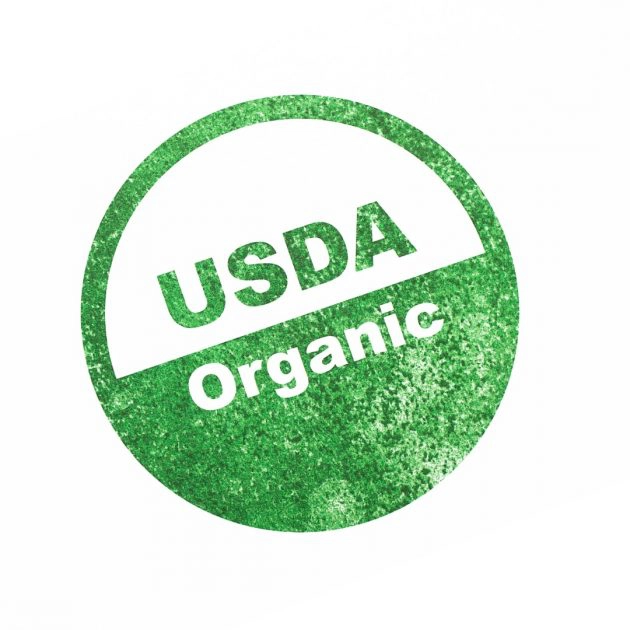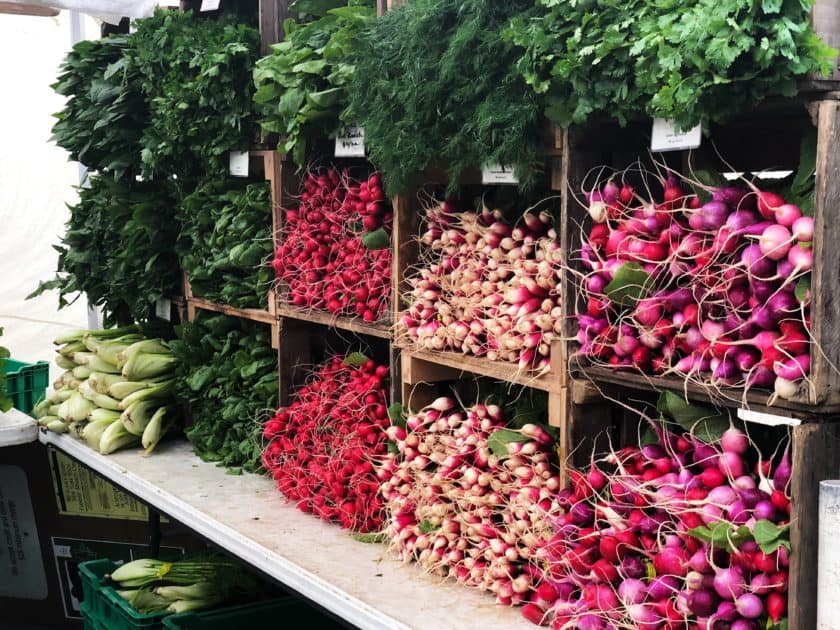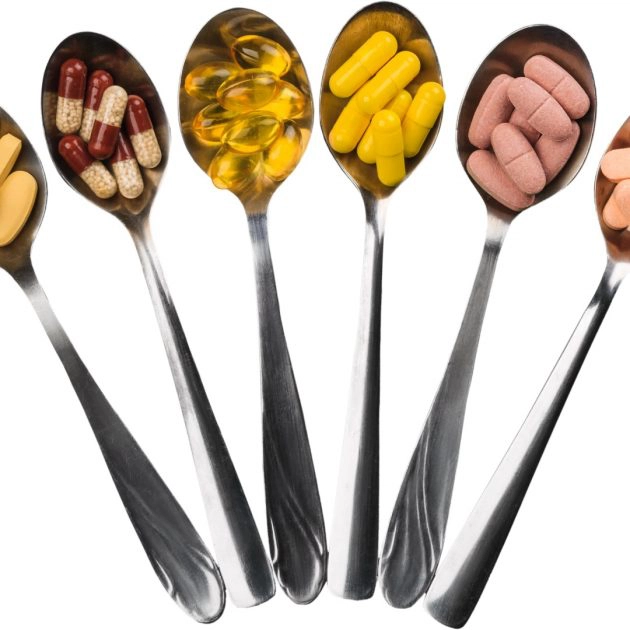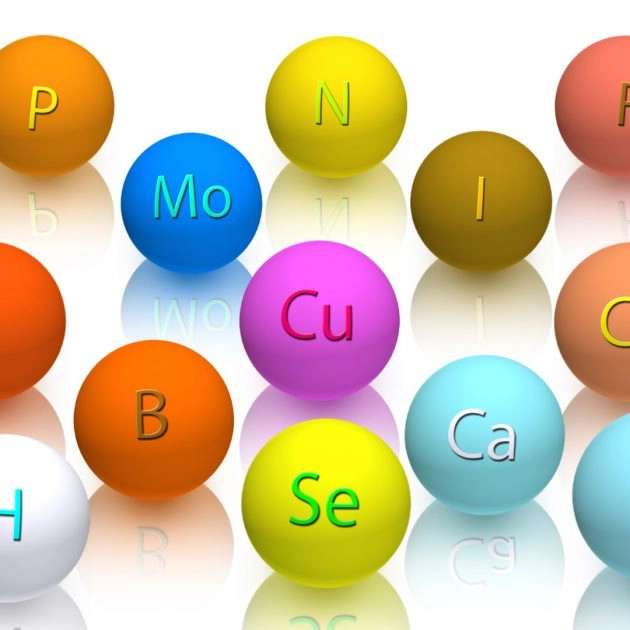INTRODUCTION
In honor of Earth Day, I’d like to go organic this week and discuss why eating this way is so important for your health and what foods you really need to be eating.
According to the Oxford dictionary, organic is defined as “(of food or farming methods) produced or involving production without the use of chemical fertilizers, pesticides, or other artificial agents.”
One key thing is that this term refers to all the parts of the production process (like feed for animals). It also means that no genetically modified seeds can be used in production. Unfortunately, not every use of this word is legit.
Keep on reading to find out how to identify what’s actually organic and when you might just need to ask more questions at the Farmer’s Market.
CAN I TRUST THE USDA LOGO?

But first, can you really trust the logo that seems to be stamped everywhere? Short answer — yes, but… The USDA logo is a certification program not a marketing term like “natural” or “all-natural” or “healthy”.
Keeping the logo requires ongoing documentation and annual inspections. The item must have a list of these ingredients with > 95% of the ingredients being organic. Animals must be fed 100% organic feed and forage and raised with “natural” living conditions.
Certified 100% Organic means that all ingredients are grown or raised according to USDA standards. The term “made with organic ingredients” on a package indicates the product contains >70% organic ingredients — these packages can NOT use the USDA logo. The organic ingredients must be labeled on the nutrition facts panel. Salt and water do not count.
If the product is less than >70% organic ingredients then no claim can be made on the front, and the organic ingredients can be identified as such. Farmers who sell <$5000 are exempt from certification so that’s when you need to get to know their practices if they are making this claim.
There’s NO approved/regulated use of organic for Aquaculture (farmed fish) so beware of things like organic (farmed) salmon. What does USDA Organic not mean: It doesn’t mean glyphosate residue-free but it does mean that glyphosate should not be used in the production process. It does mean Non-GMO but Non-GMO doesn’t necessarily mean USDA Organic.
GO ORGANIC FOR THE FOODS YOU EAT MOST OFTEN

So, what foods should you be choosing organic more often? Well, the foods you eat most often should be! That’s right – what you should eat organic is going to depend on what you eat and drink daily.
It’s not the same answer for everybody or for everyone all year long. If all winter you eat tomato sauce or drink lattes with milk but in the summer you have iced tea and blueberries, what you should be eating will change seasonally, regardless of where it appears on a list.
Why? The simplest way to improve the nutrient load your body gets is to eat more nutrients with fewer items that can irritate and interfere with body functions or challenge nutrient absorption.
GO ORGANIC WITH SUPPLEMENTS

Since supplements are a choice and one that you are making to improve your nutrition intake to promote better health, they need to be at least as good quality as your better food choices. It’s okay to have a non-organic ice cream every once in a while but it’s not okay to choose a whey protein powder daily for a boost of protein that is not.
The same goes for mushrooms, herbs, spices, and other nutrients you consume as supplements. I would rather you didn’t take the supplement and instead ate the organic food choice.
Now there are some supplemental ingredients such as wild salmon fish oil and probiotics, where this certification may not be needed or even available so there are other quality measures to look for when choosing those products.
Choose supplements that give your body what it needs to run better. Organic, yes, but also what complements your other nutrition (food, beverages, medications) choices.
WHY GO ORGANIC
MORE NUTRIENT DENSE

Why choose organic over conventionally raised fruits, veggies, and animal products? Well, conventional research confirms what we’ve known all along — organic foods like dairy contain more key nutrients (like beneficial fatty acids so don’t choose fat-free) and fewer unwanted potential irritants.
Similarly, research indicates that soybeans farmed this way are more nutrient-dense than non-organic and genetically modified soybean. Likewise, research lauds eating this type of produce as a way to get in more antioxidants, and in particular, strawberries and tomatoes contain more nutrients than their non-organic versions
FOOD IS YOUR BODY’S MEDICINE

When the body is fighting disease or looking to build and support the growth of a new life, the benefits of eating this way become even more critical. The body wants those extra nutrients, like the antioxidants mentioned above, to help it clean up inside and wage an effective battle or fully nurture the new life growing within.
BUT IT’S SOOO EXPENSIVE

I know, I know, eating organic ain’t cheap! We do what we can and we don’t stress about it because the stress will increase our body’s need for nutrients to calm it and clean up the mess that stress makes within us.
However, there are some easy ways to cut the price tag down to size.
- Write down what you or your family member ate and drank for a few days. What are the top five things you eat or drink most? Consider purchasing the ones you consume most often organic.
- Shop frozen. It’s available more often. It’s as fresh, if not fresher than the ready-to-eat options in cases or in the produce section and it will last as long and typically costs less for more.
- Whether or not it’s available, choose to eat minimally processed food. Could you do to it in your kitchen (like making juice from veggies versus removing the fat from a nut?)
- Buy in season. The organic options – all options – tend to be less expensive and more available when they are in season. This is a win for you health-wise too as the variety of nutrients and tastes contribute to better health too.
- Get Social. Often companies have discounts on their websites or will send you samples if you connect with them.
- Consider a buying club. Organic is popping up everywhere and at discounted prices at places like Thrive Market and Costco.
- Use coupons to save money on organic purchases for everything from food to supplements to clothing to skincare.
CONCLUSION
USDA Organic is not perfect, but neither is better nutrition nor is better health. Remember what the definition of better nutrition is: Better Nutrition = The nutrients you want and need + none or the least amount of ingredients that can harm or irritate your body, the environment, or other animals.
What’s one thing you can add to your lifestyle to make eating organic part of your everyday routine? If you need more personalized help, I’d love to work with you to develop a nutrition plan to meet your specific needs. Just head on over to my services page for more info on working with me.
***Disclaimer: This post is for informational purposes only and should not be construed as medical advice***

